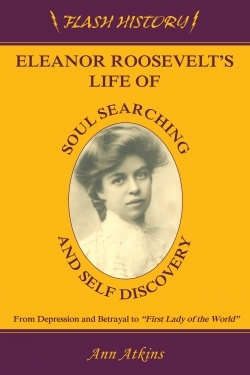
Eleanor Roosevelt's Life of Soul Searching and Self Discovery
From Depression and Betrayal to 'First Lady of the World'
Eleanor Roosevelt was one of the most influential First Ladies in United States history. Her accomplishments are especially impressive and inspiring when one considers her background and the reality of the political and social forces she faced. Ann Atkins’ biography, Eleanor Roosevelt’s Life of Soul Searching and Self Discovery: From Depression and Betrayal to “First Lady of the World,“ is a sympathetic exploration of this fascinating woman’s story.
The book is divided into four main sections exploring Eleanor’s childhood and the early years of her marriage to Franklin, moving into the causes she championed as First Lady, and ending with her work in the United Nations, with many examples of her inestimable compassion. Each section starts with a Flash Context and Comments section which gives relevant information so readers can more fully understand the significance of the information in the following chapters. Before diving into the criticism Eleanor received for being “subversive,” for example, Atkins uses the Context and Comments section to explain how alive the fear of communism was at that time.
Atkins follows each section with a Reflections for the Reader segment. Here, she highlights specific elements of Eleanor’s experience that provide the reader with ideas to think further about, often trying to provide comparison to modern life and movies. Unfortunately, while the core reflection often has truth or value, such as “a crisis can be seen as a challenge to let the old self die,” the comparison is sometimes too thinly connected or from a source that is irrelevant to the intended audience of sixteen and up. Also generously sprinkled throughout each chapter are often moving or inspiring quotes from Eleanor that also give readers points to reflect on.
The biographical and factual content is written into an overall narrative as Atkins paints a full portrait of a woman, not a vague historical character. Eleanor’s insecurities and prejudices are shared with the reader in an engaging way. Atkins’ writing is more impassioned than a typical academic biography, but is aligned with the greater intention of the book, which is clearly not an all encompassing, well-rounded biography, but rather a testament to the achievements and strengths of the subject. The book also shows how the work Eleanor did is relevant today.
The use of the present tense throughout might be odd for readers, and the cover design, with the Flash History logo on top seems slightly young for the reading level. However, the overall effect of Atkins’ writing is an approachable and favorable account of the life of one of America’s most celebrated and productive First Ladies that will intrigue and inspire middle and high-school readers, as well as those adults seeking a user-friendly biography.
Reviewed by
Alicia Sondhi
Disclosure: This article is not an endorsement, but a review. The publisher of this book provided free copies of the book and paid a small fee to have their book reviewed by a professional reviewer. Foreword Reviews and Clarion Reviews make no guarantee that the publisher will receive a positive review. Foreword Magazine, Inc. is disclosing this in accordance with the Federal Trade Commission’s 16 CFR, Part 255.
